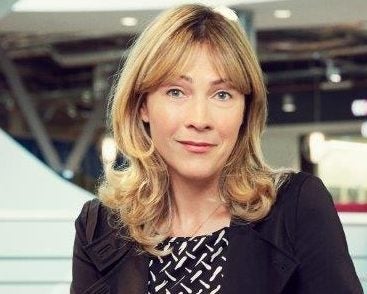
Production company ITN has reached its target of one fifth black, Asian and ethnic minority staff two years ahead of plan, but admits a lack of improvement in the pay gap is a “huge disappointment”.
ITN, which makes ITV News, Channel 4 News and 5 News, has reported a mean ethnicity pay gap of 19.4% in April 2020, down only marginally from 19.6% last year. It is targeting a pay gap of 8.1% by 2022.
Its median pay gap has also fallen slightly from 22.9% to 20.8%.
Chief executive Anna Mallett (pictured) said the lack of progress on the pay gap was a “huge disappointment”.
The proportion of BAME staff at all levels of ITN has improved in the past year but particularly in junior roles, meaning the overall pay gap was not hugely affected.
BAME representation in ITN’s top 20 earners is 10%, with a target of 20% in 2022.
Some 35% of new hires at ITN in the past five months were from ethnic minorities and a recent staff census showed representation of 20.1%, rising to 25.3% for on-screen staff.
ITN staff were told at a town hall meeting of a new diversity and inclusion action plan, the creation of which was the “number one priority” in a recent away day for senior leaders.
| BAME pay gap | 2020 | 2019 | 2018 | 2022 target |
| Mean | 19.40% | 19.60% | 16.10% | 8.10% |
| Median | 20.80% | 22.90% | 20.80% | Not given |
ITN’s four priorities in its action plan are: focusing on diverse recruitment, especially at senior levels; breaking down barriers to progression; increasing the share of diverse voices in editorial and management; and improving a culture of transparency and accountability.
The company is starting to trial using anonymous CVs in recruitment for all roles for three months until September and is introducing BAME representation on interview panels for all new roles from August.
It is also creating a new database of diverse freelance talent and introducing new initiatives to “drive diversity in editorial decision-making”.
Mallett said: “Creating a vibrant, inclusive, collaborative culture – a culture where people feel confident to speak up – is central to my vision for ITN. This is a special and unique company. Our services reach millions of people across the UK, every day. We drive transformation by telling the truth about what is happening and by holding those in power to account.
“But our values of truth and transparency also demand we look inwards. What is clear is that we have not educated ourselves enough, listened enough or done enough and while we have made progress – parts of this report are extremely encouraging – we are not where we need to be.
“Getting this right is central to our creative and commercial success and for me, it all starts with the data. This strategic process – data collection, mapping, interrogation – is vital to ensuring a pipeline of talent and progression at every level.”
Gender pay gap
ITN has also voluntarily published its 2020 gender pay gap information, showing it has reduced by more than a third in the past year from 15% to 9.7% (favouring men).
This means the company has overtaken its target to reach a mean gender pay gap of 9.8% by 2022.
Some 60% of new hires in the past five months were women and the company is now made up of 47.5% women, with a target of reaching equitability by 2022. Some 50.5% of on-screen staff are already women.
| Gender pay gap | 2020 | 2019 | 2018 | 2022 target |
| Mean | 9.70% | 15% | 16.70% | 9.80% |
| Median | 13.60% | 16.80% | 18.10% | Not given |
Female representation in ITN’s top 20 earners is 35%, with a target of 50% in 2022.
LGBTQ+ staff are currently well-represented, with 8% representation beating a target of 6% by 2022, while disabled staff are under-represented with 3.7% and a target of 5% within two years.
Mallett said: “I want to use my position as ITN’s leader to do all I can to create lasting, structural, change.
“We can control many things – who we hire, how we progress talented people, which voices we have at senior levels, what information we share as a company, the targets we set ourselves and of course, what we put on our news bulletins and in our programmes. And I am taking personal responsibility for our accelerated plan of action.”
Two senior journalists recently told Press Gazette there is still “a lot of work to do” to change newsroom culture at all levels, citing a “culture of fear and cliquiness” hindering black and ethnic minority journalists’ careers.
Picture: ITN
Email pged@pressgazette.co.uk to point out mistakes, provide story tips or send in a letter for publication on our "Letters Page" blog
